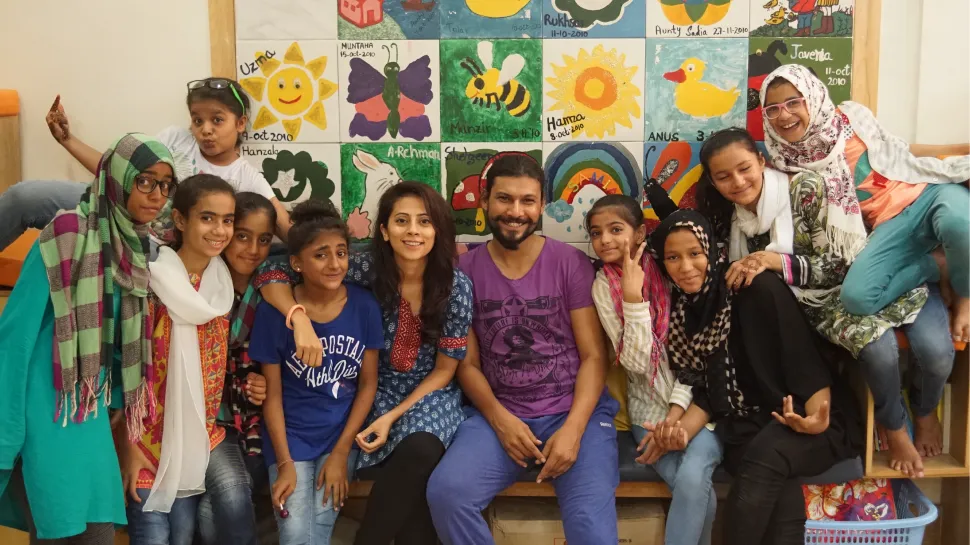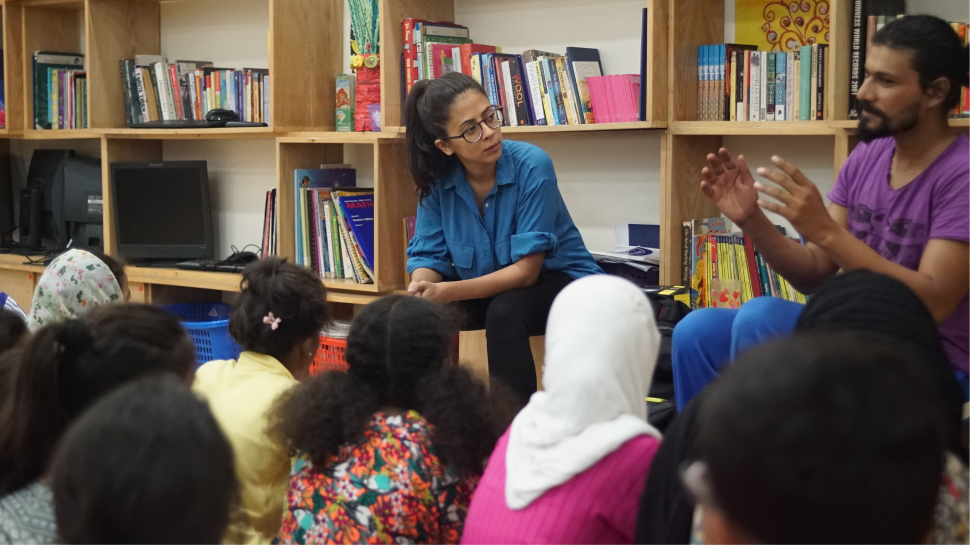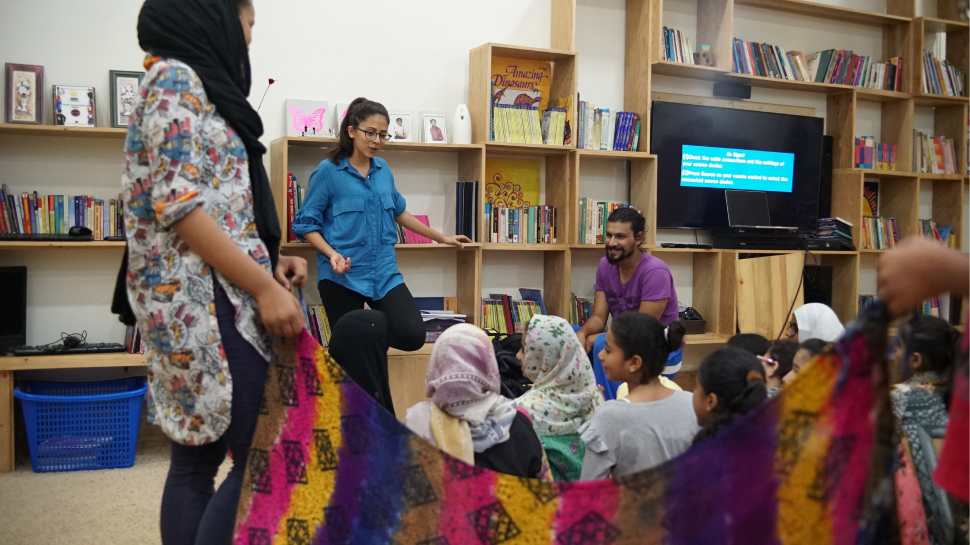Davis Peace Prize
(2017)
Title of Project: Peace-building through Storytelling
Location of Project: Lyari, Karachi, Pakistan
Sponsoring college: International House (NYC)
Student, Home Country, College: Meher Jaffri, Pakistan, The New School (NYC)
UWC attended: UWC – South East Asia

MISSION: Peace-Building Through Storytelling project aimed to use storytelling, creative writing and the performing arts as a means of building critical thinking skills and self-expression and expanding perspectives, i.e. the preconditions for peace. With guidance from the Davis advisors at I-House, this project was an attempt to revive and promote the storytelling culture amongst marginalized youth in Karachi, Pakistan with a focus on the tradition of Urdu storytelling and theatre.

CURRICULUM: The final curriculum had 5 groups of students (each group comprising 10-12 students) who went through the following program:
- A 3-day Storytelling workshop followed by a 3-day Spoken Word workshop.
- The first group of children (selected by the administration as academic high performer) was handpicked by for an 8-week Theatre workshop, working towards putting up a theatre play for the community and possible future donors.
The play was be performed on September 22nd, 2017.

Section I
Summary: The project aims to use storytelling, creative writing and the performing arts as a means of building critical thinking skills and self-expression and expanding perspectives, i.e. the preconditions for peace.
Successes and learnings:
1. The methodology behind selecting the partner organization, designing the program in conjunction with the partner organization and forming the project team with key personnel proved to be a crucial part of the project’s success. I specifically targeted the Kiran Foundation in the Lyari neighborhood of Karachi, a neighborhood that has been plagued with a history of gang warfare and violence for the past six decades.1 I also selected Kiran also due to the responsiveness and high level of engagement of its administration in the planning phase. This was crucial in contributing to devising a program with real impact and the possibility of sustainability. I was able to customize the curriculum according to the children’s’ specific aptitude and needs based on comprehensive discussions with the administration and faculty.
2. Having the flexibility to ‘right-size’:
Initially there were 2 branches of another school that were supposed to partner with my Davis project, but despite their having indicated strong interest in the project, by the time of implementation their management was undergoing a major change and they were not as responsive during the planning phase as I hoped. With guidance from the Davis advisors at I-House I did not include the school and instead enriched the program at Kiran School and its partner school DCTO (a government school adopted by Kiran).There is a certain natural disconnect between the time of planning and implementation of the project due to the time lag between the phases and the fact that I was in New York when planning a project in Pakistan. Once I arrived in Pakistan and met with the administration, students and school I was really able to gauge the needs, wants, infrastructure and resources available. This was necessary to implement the most optimal project.
3. Curriculum:
While initially the project entailed conducting Storytelling workshops with 15-20 groups of students, I re-designed and enriched the program based on input from the partner organization and customized to the students. The final curriculum had 5 groups of students (each group comprising 10-12 students) who would go through the following program:
- A 3-day Storytelling workshop followed by a 3-day Spoken Word workshop.
- The first group of children (selected by the administration as academic high performer) was handpicked by for an 8-week Theatre workshop and is working towards putting up a theatre play for the community and possible future donors. This play will be performed on September 22nd.
4. Impact:
The final enriched Peace-building via Storytelling program with Kiran Foundation has taught 50- 60 students first, the fundamentals of storytelling through written stories and performance art. They have been entertained with storytelling performances, examined story structure, the use of voice and body in performance expression and experimented with performing. This was followed by the spoken word workshop where students were shown various spoken word performances
1 http://www.bbc.com/news/world-asia-17895164.whose content and form of expression was analyzed. Through various games and spoken word exercises, they were taught to express themselves and their own stories via the written word,specifically for the intent of ‘performing’ it in front of an audience. As mentioned above, a selected group of students were allowed to do an intensive 8-week theatre workshop and are working towards putting up a final play.
The above activities have increased exposure of the students to performing art in an immersive manner. They have built self-confidence, various tools for self-expression, patience, openmindedness, imagination, critical analysis and problem solving skills as well as getting more in touch with their voices and bodies as modes of communication. Gauging from feedback from the students, they are learning how to think ‘out of the box’ when it comes to expressing themselves.
5. Sustainability:
I designed the program in such a way that there would be a final “outcome” (i.e. the theatre play put on by the select 20 students) to show of it, in order to be able to invite high net worth individuals, philanthropists and possibly the media to help Kiran Foundation raise awareness of the need, possibilities and benefits of theatre and storytelling related program for the youth of Lyari. In this way the Davis Peace Project has served as a successful pilot project that hopes to attract funding to sustain the initiative via the theatre play which we will invite possible partners for the future.
Section II
Peace is the state of harmonic equilibrium between parties that understand each other as well as those who may not, but do understand that there might be a reason for their differences they are not aware of and the need to continually keep an open mind to hearing other perspectives. This requires communication skills, the ability to express oneself, listen, critically analyze information, and being able to imagine situations and scenarios that one has not experienced. Pakistan’s education system is notorious for its requirement and reliance on ‘memorization of facts’ approach. This leads to a poor grasp of abstract knowledge that is imperative to building critical thinking skills. My project proposes to fill this gap in children’s education by using storytelling, creative writing and the performing arts, targeting underprivileged children that have less access to travel and other resources.
These children often do not have gender-integrated playtime in their personal lives (and often in school too). I have seen first-hand the impact of them interacting with the other gender in a playful, exploratory and safe manner. It enables them to normalize the other and expand their imaginations. This has been a massive catalyst for the development of problem solving skills in these children, as they are required to improvise props, storylines, and ways of expressing themselves. The performing arts require exercising of voice and body that leads to a very visceral learning, challenging them to expand modes of expression and communication.Having to suspend disbelief, as is required in drama and story telling, they exercise imagination skills that are important for processing abstract concepts, the basis of critical thinking. In the short term, these children have learnt to express themselves and their stories more effectively, not only intellectually, but also by using the whole range of their bodies. In the long term, these students, who are being groomed to be the future leaders of Lyari will use their experiences to advocate for better education and resources for their community and plant the seeds of tolerance and encouragement diversity of expression, the factors that enable peace in a community.
I have long believed in the transformational power of storytelling and dramatic arts from experience, but to be able to test it out the theory with this group of children was eye-opening.Some naïve notions were corrected and other pre-conceived notions were affirmed. I learnt how to maneuver to different needs and that he approach needs to be nuanced and sensitive to the realities. This project also allowed me to work in a part of town I might not otherwise have been able to have access to due to various barriers of geographical freedom for women in Pakistan
“Storytelling and performance art exercises the under-utilized areas of the brain and body to induce critical thinking, self-expression and the expanding of perspective. These, I believe, are the preconditions for tolerance, the celebration of diversity and ultimately, peace.” (Meher Jaffri)



